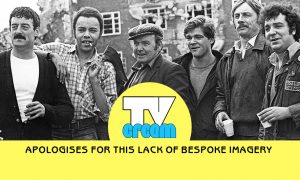‘A charade in two acts’ from the always-reliable Stewart Parker (his first televised work) making a wry, poignant farce out of the Northern Ireland situation. Three English and music teachers in a Belfast school – Martyn Semple (Catholic, easygoing), Roy Fletcher (protestant, careworn) and Monagh Calhoon (something of a muse for the lads, romantically involved, on and off, with Roy) find themselves made redundant after an après-end-of-term show celebration in a classroom with a bottle of champagne and an impromptu rendition of The Stripper is witnessed by the stentorian headmaster. Freshly benefit-bound, Monagh heads for Dublin to pursue a singing career, while Martyn and Roy toy with songwriting.
Martyn’s path crosses with another ex-teacher and old flame Marie Kyle, who left the profession in the early 1970s to become a fervent campaigner for Sinn Fein. Marie offers the boys thirty quid a throw to churn out street ballads for freshly-slain Catholic freedom fighters. The boys, desperate to keep as well away from politics as possible but needing the money, knock up some doggerel and chords for the occasion. Then, along with the usual rejection letters from record labels, two bullets arrive in the post. One of their other gigs – doing musical numbers and gags for a Protestant drinking club as a favour to Roy’s cousin – has been reported in the local press, and now they have a reputation as double agents.
Fleeing the north, they hitch up with Monagh in a dreary Dublin club, performing as ‘Monagh Lisa’ under the aegis of the supercilious Mrs Barker. The pair carry on bashing out love songs, as Monagh’s agent gets her tempting gigs in a women’s prison. Then, with a record deal finally materialising, things really start to look up, though a farcical celebration with an uncooked chicken bodes ill for the future. While Roy, initially the pessimist of the duo, becomes joyously enthused by the new opportunities, Martyn turns thoughtful, doubtful even, about the relevance of churning out Eurovision-style pop songs. Meanwhile, Monagh starts visibly disintegrating under pressure from prison gigs, fraught recording sessions and, unknown to the lads, has been having an affair with a documentary maker who is embroiled in cross-party negotiations.
Finally, the really big break arrives – penning Ireland’s entry for that year’s… Ettelbruck Song Contest. Not quite the big one, but the lads are overjoyed nonetheless. The night before, a party with a Dublin publisher, Monagh’s agent, and a music press hack results in drunken indiscretions about those death threats, and a plastered Monagh finally cracking up outside, and telling the boys that Playfair (the broadcaster) has been shot dead while filming a street battle. Not in the best of states, the trio flunk the contest (off camera) and disconsolately sit in the airport waiting for the flight back home, ripping open ‘good luck’ telegrams. A parcel sent to them turns out to be a letterbomb, leading to the bizarre final shot of the boys scrabbling around on the floor, bloodied, while Monagh absently sings their song entry, ‘Crybaby’.
Parker handles the discrepancy between the seriousness of the subject matter and the inherent daftness of the showbiz lower echelons with ease – the two boys are shown to have swapped the real farce of Irish politics for the fabricated one of writing jingles for frozen poultry without making too heavy-handed a statement. And, as Roy and Martyn move to Dublin, to London and to Ettelbruck, it’s clear there’s really no escape from Belfast – the harder they try to get out, the more they dig themselves in. Add to that the often inspired cross-talk between the main characters, some nifty ‘cheesy’ songs, amusing turns from a corny ‘t’ick Oirishman’ pub comedian and previous Ettelbruck winner Willy Zero performing The Zig-Zag Song, and perfectly-judged ‘tragic farce’ is the result.

















